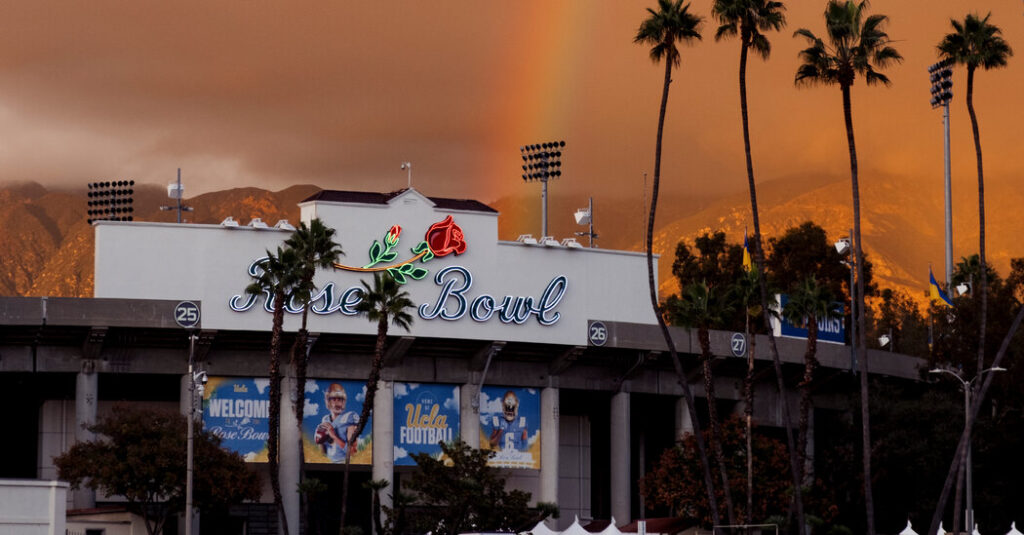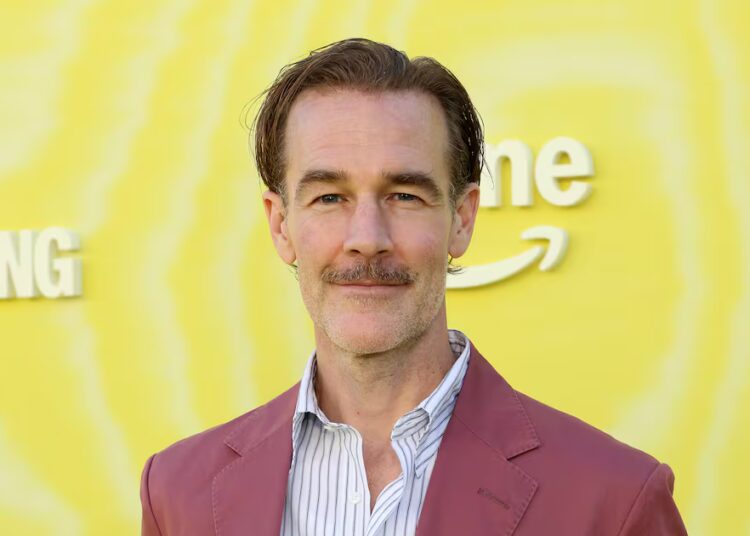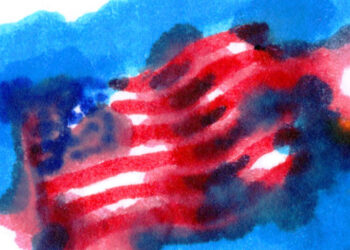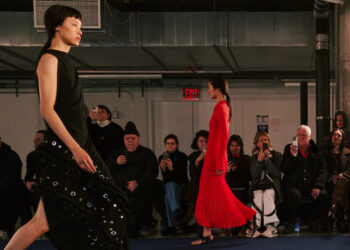In Southern California, a place with more than its share of famous couples, few celebrity relationships have been as enduring as that of the Rose Bowl and the University of California, Los Angeles.
For 43 years, the Pasadena landmark has been the home field for the elite university’s football program. Never mind that the stadium and the school are 26 miles apart. Marriage is cumulative, and U.C.L.A. and the Rose Bowl have had much to bind them: Four decades. Millions of dollars. An ironclad deal.
Or so it seemed until last month, when Pasadena officials went to court, claiming that U.C.L.A. had been plotting for months in secret to relocate to SoFi Stadium, a newer, closer and glitzier venue. Such a move, Pasadena said, would irreparably harm the Rose Bowl and the city, which owns the stadium and borrowed heavily to refurbish it on condition that the team would remain through June 2044.
The university, in a terse statement, said that “no decision has been made.” But behind the scenes, Pasadena said, the university’s lawyers had informed the city’s lawyers that the school would be “moving on” after this season.
Since then, Southern Californians have watched awkwardly and painfully, like children caught up in a drawn-out divorce. Major law firms have been deployed. Professional experts have been consulted. Alumni have taken sides along generational and geographic lines.
“It’s an unholy mess,” said John Sandbrook, 76, a former U.C.L.A. assistant chancellor who in 1982 helped negotiate the Rose Bowl contract between the university and Pasadena.
Chris Rising, 56, a real estate developer who lives near the Bowl and whose father, Nelson Rising, was a major U.C.L.A. donor, said his family was so angry and hurt that he decided not to help endow a new masters of real estate development program.
Kai Dizon, 20, a sportswriter for The Daily Bruin, the U.C.L.A. student newspaper, was excited. If the team, which has lost seven out of 10 games this year, would only stop playing an hour away in “a dump gilded in someone else’s nostalgia,” he wrote, maybe the stands wouldn’t be more than half empty at every game.
As the Bruins prepared to meet the University of Washington on Saturday for their final home game of the season, speculation has focused on the possibility that this also might be their last home game at the Rose Bowl.
“If the Rose Bowl and U.C.L.A. were to go separate ways, it would be a seismic shock in Los Angeles, and I do not think that’s an overstatement,” said Evan Lovett, 47, a U.C.L.A. alumnus and the creator of “L.A. in a Minute,” a popular online show about Los Angeles history and culture.
But, he added, “there is also a certain perspective of: ‘This could be great for recruiting. Who doesn’t want to play at SoFi?’”
In Southern California, the venues in question need no introduction.
On one side of the metropolis, Pasadena’s 103-year-old Rose Bowl, internationally known for its uncomfortable seats and breathtaking sunsets. On the other, five-year-old SoFi, a palatial $5.5 billion complex in Inglewood with two N.F.L. teams and many luxury suites, but debatable tailgating amenities.
Caught in the middle are two pillars of the West Coast establishment: The city of Pasadena, known worldwide as the home of the Tournament of Roses, the nationally televised parade and football game that snowed-in Americans watch each New Year’s Day with intense weather envy. And U.C.L.A., a top-ranked university with an enrollment of more than 48,000 students and increasing financial challenges.
Unlike many schools, U.C.L.A.’s football team does not host games on campus. Its neighbors in dense, affluent West Los Angeles have steadfastly opposed stadium proposals. Instead, the football program, like that of its rival, the University of Southern California, plays in public venues.
From the late 1920s until the early 1980s, another historic stadium, the Los Angeles Coliseum, hosted both teams, an arrangement that had continued even after 1946, when the Coliseum added two professional football tenants, the Los Angeles Rams and the short-lived Los Angeles Dons.
In 1980, the Rams relocated. Two litigation-filled years later, the Oakland Raiders moved to Los Angeles. Even before they arrived, recalled Mr. Sandbrook, the former U.C.L.A. assistant chancellor, U.C.L.A. realized that the Raiders and U.S.C., which is next to the Coliseum, would dominate the venue. When the Coliseum’s governing board approved a lease without letting his boss at the time, Chancellor Charles E. Young, even speak in opposition, Mr. Sandbrook said, the chancellor told him to set Rose Bowl negotiations in motion. Two intensive weeks later, they had a deal.
The Los Angeles mayor at the time, Tom Bradley, opposed the move. Homeowners in the stately neighborhoods around the Rose Bowl balked at the traffic. Some still wonder whether it made sense for a school on Los Angeles’s showbiz-heavy Westside to send its team to a far-off field in genteel Pasadena.
“They always seemed a little out of place here,” said Jim Robertson, 78, a local retiree taking a walk on a recent weekday outside the bucolic stadium.
But the university got a world-renowned venue and more of the revenues than at the Coliseum, and did not have to share space and branding with two high-profile programs. And Pasadena got an anchor tenant to help cover maintenance and upgrades. Attendance surged as U.C.L.A. rose to the top of its athletic conference at the time, winning the New Year’s Day Rose Bowl in three of the next four years.
As decades passed, teams began abandoning iconic stadiums like Florida’s Orange Bowl for new sports complexes. Pasadena officials worried that Los Angeles might get a new N.F.L. stadium someday and the Rose Bowl could lose U.C.L.A. In 2010, the agreement was renewed.
Since then, the Rose Bowl has issued city-backed bonds to invest more than $150 million in stadium improvements. The pavilion housing a new press box and premium seating has been named for the longtime U.C.L.A. football coach Terry Donahue. The home locker room is named for former Chancellor Young. In January, work is set to begin on a renovation and an exclusive field club in the south end zone.
U.C.L.A. pays no rent. Instead, the Rose Bowl takes a substantial percentage of ticket sales, concessions and other ancillary revenue such as box seats. Under the contract, U.C.L.A. cannot play home football games anywhere else in Los Angeles or Orange Counties, cannot terminate the contract and must remain at the stadium until the bond debt’s scheduled repayment 19 years from now.
But the world in which U.C.L.A. signed the deal is not the world it finds itself in now. New rules have pushed collegiate athletics more toward a professional business model, and new leaders oversee the university and its finances. U.C.L.A.’s new chancellor, Julio Frenk, arrived this year. Its new chief financial officer, Stephen J. Agostini, arrived last year. Its athletic director, Martin Jarmond, was hired in 2020. Rose Bowl defenders note pointedly that all came from outside California.
In May, members of the University of California Board of Regents grilled the three U.C.L.A. officials about the athletic department’s financial situation, including structural deficits that have left the department with annual shortfalls of tens of millions of dollars. A new regent, Bob Myers, the former general manager of the Golden State Warriors, rubbed his brow as the group explained that the lack of an on-campus stadium deprived U.C.L.A. of revenue streams common to other schools.
Mr. Jarmond, the athletic director, told him that other Big Ten programs earned $15 million to $25 million a year from premium and club seats, but U.C.L.A. captured none of that under its deal with the Rose Bowl. The end zone renovation would bring U.C.L.A. some premium seat income, he said, but not until after next year.
That exchange occurred about three months after Rose Bowl officials said they had begun to hear rumors that U.C.L.A. was moving to SoFi.
City officials said U.C.L.A. at first denied the rumors. In October, though, city officials said, a lawyer for the university told one of Pasadena’s lawyers that U.C.L.A. no longer wanted to play at the Rose Bowl and planned to relocate “sooner rather than later.”
The university’s lawyer, identified in court documents as Jeffrey S. Moorad, the head of the global sports industry team at the law firm Morgan Lewis, did not respond to requests for comment. At a recent court appearance, a team of U.C.L.A. lawyers from another high-profile law firm, Gibson Dunn, said the city was jumping to conclusions. But they added only that U.C.L.A. intended to finish this season at the Rose Bowl. A spokesperson for SoFi Stadium said its owners “do not have a comment at this time.”
In Pasadena, the dispute has cut to the civic core, raising questions that go to the very identity of the city of more than 138,000 people.
“The Rose Bowl is the heart and soul of Pasadena, and the heart and soul of the Rose Bowl is college football,” said Mayor Victor Gordo, a Mexican immigrant who, as a child, worked outside the stadium selling little stuffed footballs. “This isn’t like a lease agreement for a condo.”
The Bowl is a stalwart venue for concerts, soccer, flea markets and other uses, the mayor said, and will host events in the 2028 Olympics. But without U.C.L.A., its football schedule could shrink to the New Year’s Day game and the Turkey Tussle, an annual showdown between two rival high school teams.
Don Smith, the manager of The 35er Bar in the Old Town Pasadena business district, attributed about 20 percent of the bar’s monthly revenue during football season to home games. “U.C.L.A. made a commitment and in return, the city invested,” Mr. Smith said. “Now U.C.L.A. wants to run out the door with our tax dollars? Just, ‘See ya later, Pasadena, have a good day?’”
Mr. Smith said he hoped that the university would reconsider. “If U.C.L.A. is in contention, the U.C.L.A. fans show up,” he said.
His advice? Win more games. Maybe, as in all marriages, this was just a rough patch.
Shawn Hubler is The Times’s Los Angeles bureau chief, reporting on the news, trends and personalities of Southern California.
The post The War of the Rose Bowl appeared first on New York Times.




